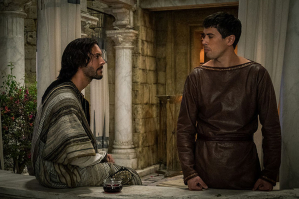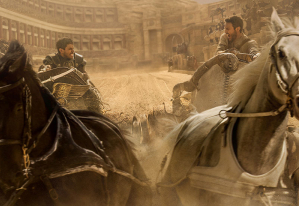Toby Kebbell, who stars in Paramount Pictures and MGM's reboot of "Ben-Hur" as Messala, shared how he identifies with his character and why he doesn't want audiences to view him as the "villain."
The BAFTA-nominated actor stars as the adopted brother of Jewish prince Judah Ben-Hur (Jack Huston) in the film produced by Roma Downey and Mark Burnett. Messala becomes a key figure in the Roman army and ultimately accuses Judah of treason, sending him into years of exile as a galley slave until Judah comes back, determined to get his revenge.
During a sit-down interview with The Gospel Herald in Beverly Hills, California, Kebbell revealed that while his character may be viewed as the "villain", he, on some level, identifies with Messala.
"It was difficult," he said of playing the antagonist. "Not revealing too much about my personal life, but it's one of those [things] where I understood it. I understood where you can be ambitious to the point where you become slightly blinded with your selfishness - that no one else really sees your dream, they don't see it from your point of view."
He added, "I don't want to play the 'bad guy,' the 'villain', but I wanted to play somebody who is the best friend of someone and is then insulted and hurt, their pride is hurt by what they consider to be stupid, weak behavior, and they're so engrossed with their rage - not with anyone there, but just their own private rage. It's selfishness, really."

The relationship between Judah and Messala is the core of the story, and while both men struggle with anger, resentment, and bitterness, they are ultimately redeemed by the influence of Jesus Christ, (Rodrigo Santoro) allowing them to extend forgiveness to one another. When asked what he hopes viewers take away from the brother's relationship, Kebbell stressed the importance of forgiving oneself for past mistakes.
"We burden ourselves with our mistakes. As much as others punish, we burden ourselves with it," he said. "Horrific shame will lead you down a terrible path. If you made a mistake and you're genuinely sorry, you hopefully can find it in yourself to say, 'I made a mistake, I'm really genuinely sorry about my terrible mistake.' Otherwise, you'll never be able to accept...forgiveness. The point is, anything dirty can become clean, so you kind of have to appreciate forgiveness for yourself. That's what we were trying to get across with our relationship."

The past tellings of "Ben-Hur" are known for the epic chariot races - and this new and improved remake does not disappoint. Kebbell joked he grew his "weird back muscle" learning how to drive a chariot pulled by four horses while taping the action-packed film.
And while it hasn't happened yet, he fully expects internal growth to happen down the road: "You get little spurts of change and growth," Kebbell said. "It tends to not happen for awhile after. You've got to allow growth. You can't plant a rose tree and expect roses year one, two or three. You've got to let it settle somehow. So, I don't force the growth, I try to let it occur as it does. So, if I'm lucky enough to catch it, I'm lucky."
"Ben-Hur" hit theaters on Aug. 19 in the U.S., and is also available in 3D and Digital 3D. For more information visit ShareBenHur.com.






